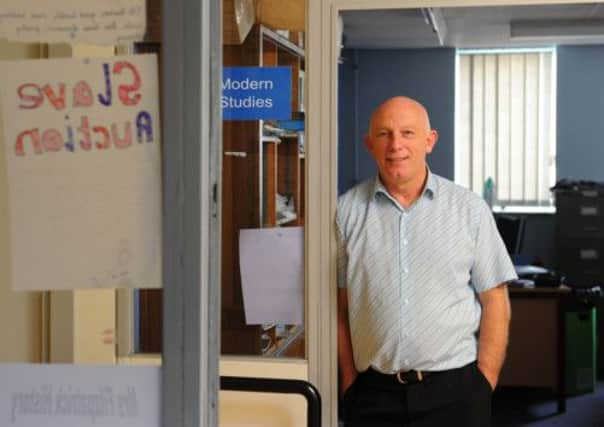Hugh Reilly: Oldies in classroom not so golden


My onward progress, however, was somewhat halted by the open palm of a stout doorman, who said rather assertively: “Not tonight sir, regulars only.”
A veteran of pub knock backs, I endeavoured to disarm the steroid-enhanced, malformed doorman by way of humour. “I’m a self-employed window cleaner on my work’s night out,” I chortled. He smiled, but a swivelling of his bald dome intimated that my presence was superfluous to the profit margins of the pub.
Advertisement
Hide AdAdvertisement
Hide AdMy heart told me to lamp this minimum-wage prize-fighter, but my head reminded me that I was a bare-knuckle biro-pusher; instigating violence would only prove that a lemming had a greater sense of self-preservation. Instead, I tried an intellectual approach: “I can’t ever be a regular if you deny me entry. Don’t you agree this is a tad Kafkaesque?” His impassive visage eerily resembled the faces of unfortunate folk in Holyrood’s public gallery listening to Johann Lamont reading aloud her ghost-written one-liners.
An academic, the quaintly named Irwin Turbitt, is a member of the Kafka Brigade. This organisation (it does exist), aims to reduce government bureaucracy and deliver better services to taxpayers. Last month, Turbitt, a senior fellow at the University of Warwick’s Institute of Governance, addressed the annual conference of the Association of Directors of Education in Scotland, with regard to tackling inequality in educational attainment. He urged directorates to bring pensioners and other time-rich members of society into the nation’s classrooms. This Dad’s (and Mum’s) Army was an “enormous and productive free resource”, he opined. When it was pointed out there would be large-scale OAP resistance to such a notion, Turbitt struck a patriotic note by declaring it to be the people’s “duty as citizens” to help out.
Locked inside his Ivory Tower, Turbitt seems blissfully unaware that raising a pensioner battalion of school assistants is problematic. For example, as tempting though it may sound, sending council press-gangs into libraries to round up unsuspecting heat-seekers and occasional readers would only enjoy limited success. A cornered OAP limply holding a People’s Friend would fib about his age to avoid the draft, hoping that his recent Botox session fooled the kidnapping crew.
On the plus side, concessionary-card-carrying types could teach kids arithmetic through the medium of dominos (albeit minus the hauf and half pint). Having a tribe of elders in a secondary school could potentially improve discipline; the sanction of last resort, that is, of being sent to the staffroom to listen to grumpy auld men would shape the behaviour of even the most recidivist element.
Sadly, the proposed stumbling step-change in how best to deliver education would not be cost-free. In geography classes, defibrillators would need to be on hand for pensioners who discover that one quarter of the world map is no longer pink. The shock of finding out that Britain’s empire now comprises the Falklands, Gibraltar and Rockall may prove too much.
To be serious, having geriatric Joe Public’s presence in the classroom as an answer for any perceived woes of our education system is not so much a magic bullet, more a suppository. For one thing, given the corrosive wave of paedophilia hysteria that causes suspicion whenever an elderly male indulges in basic human interaction, such as hugging or putting a child on his lap, I’m certain that many parents would object. For another, adding well-meaning but unqualified people to the classroom mix would further dilute the diminished status of teachers.
Nobody in their right mind would invite a daytime telly aficionado to assist a surgeon or expect a pensioner to chip in with ideas when a lawyer is preparing a defence strategy. Why is it that, alone of the professions, teaching is seen to be something that anyone can do?
Does the question “How was school today, grandpa?” not tell us that something is wrong with this picture?
School premises should operate a strict door policy and be for “regulars only”.